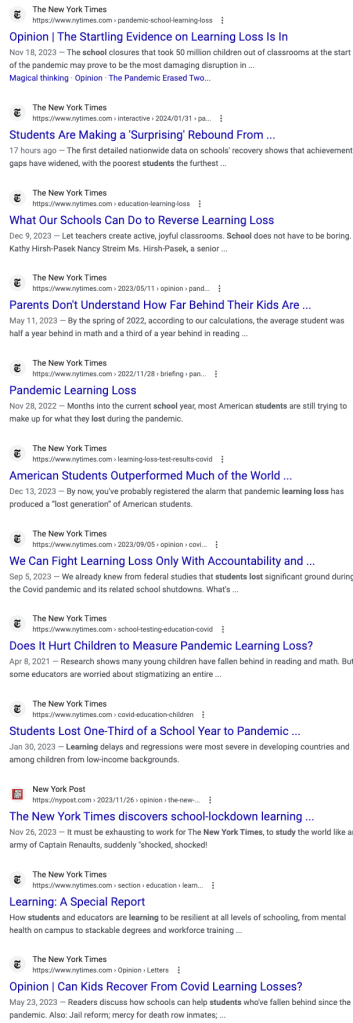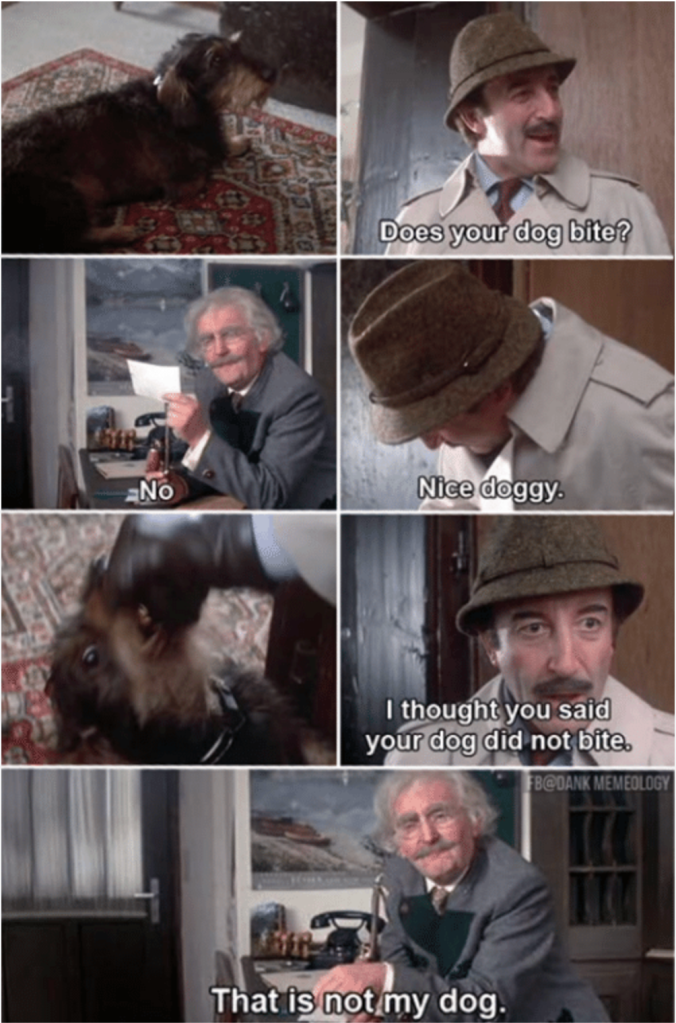Does your dog bite?
This is a post about questions that do harm, but do not make sense.
Does your dog bite? Really? No. Here’s my question.
“Can you help me find my bicycle?” “I don’t know, what does it look like?” “I don’t know. I don’t have one.”
See, the question doesn’t make sense. That was my turn. Now it’s The New York Times’ turn. Perhaps they want to talk about “learning loss” – they do that a lot. “Our students suffer learning loss” – says the Times, whose staff’s children are presumably not part of ‘our students’. “What did they learn and then ‘lose’ or forget?”
You know why there’s no answer? Because the question doesn’t make sense. Because the claim makes no sense. It would be easy to call the Times ignorant, but no. They know that “learning loss” is an artifact of ignoring students (who do learn) and instead looking at standardized test scores. They keep harping on “learning loss” because it fits their narrative.
And I’m not going to make the case here – but for The New York Times, pushing a preferred narrative is their primary purpose. They pretend to cover news as a cover. WMD. Learning Loss. Anti-progressivism. This is the publishing arm of an unpopular political current.
Today they had a different line: “children are still behind.” Behind what? They don’t say. “The students are nowhere close to being fully caught up.” Caught up to what? They don’t say. “In math, students have made up about a third of what they lost.” What did they ‘lose’? The Times does not say. They can’t say. There is no answer. They are hoping you don’t ask the question.
What happened
The pandemic came. Schools shut down. There was a really badly thought out plan to keep schools “open” even while they couldn’t be. Schools did something, students did something, but it wasn’t close to ‘normal’ school. Students’ educations were interrupted – some completely, some partially.
Interrupted Education
Education is interrupted for many reasons. Sometimes a family moves, and in that move school attendance is disrupted. Sometimes there is a crisis in a family, and school attendance takes a back seat. In circumstances like that, decisions are made on a case by case basis – give the student extra support to “catch up to where she/he otherwise would be” or let the student repeat learning the content that was missed.
But sometimes there are bigger disruption, bigger interruptions. War, famine – what does The New York Times say about ‘learning loss’ in Gaza? Child labor. Forced migration. What do societies do when education is interrupted, and then can restart? They pick up kids where they left off.
The pick up kids where they left off.
When a child transfers into our school system from another state or another country, we do not choose their courses (at least in high school) simply based on their age. We look at what they have already studied, and mastered, and what they have not studied. And we schedule them appropriately.
What should have happened
When schools came back, functioning almost normally, we had an opportunity. We could have assessed, and adjusted curricula to start where students were. We could have, we should have, scheduled students appropriately.
But that was not what happened.
What was the response
Sadly, educators’ voices were marginalized. Non-educators, who the Times speaks for, held sway. Our union, who should have been speaking for the rights of our students and teachers, instead pushed the myth that our schools had been open, and were fine. “New York City” boasted Mulgrew “kept our schools open.” If he’s boasting that our schools were open, he’s not so likely to talk about appropriate curriculum for students whose educations were interrupted. Because if education was interrupted, that would mean schools had not been really ‘open’. He could stick to his false narrative, or he could help students and teachers. He liked the narrative.
The children and their needs were marginalized. High stakes testing was centered. And each child was dropped into the course they would have been placed in had we not just suffered through a pandemic. This was cruel. This was frustrating. And this was totally unnecessary.
And my response
When a child has needs, and the system does not adjust to meet those needs, the child has not failed the system.
The system (think Department of Education. think the New York Times) has failed our children.
And no, my dog does not bite.
But you know…



